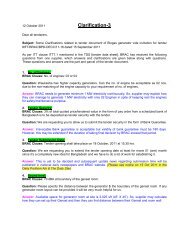Combining health and social protection measures to reach the ultra ...
Combining health and social protection measures to reach the ultra ...
Combining health and social protection measures to reach the ultra ...
- No tags were found...
You also want an ePaper? Increase the reach of your titles
YUMPU automatically turns print PDFs into web optimized ePapers that Google loves.
Research resourcestreatment is provided <strong>to</strong> hundreds of thous<strong>and</strong>s of childrenannually in Kenya <strong>and</strong>, almost certainly, <strong>to</strong> millions ofchildren throughout Africa. Major gains in child survival canonly be made if improved preventive <strong>and</strong> primary care arecombined with <strong>the</strong> right treatment at <strong>the</strong> right time for thosethat present with severe disease. In Kenya, <strong>the</strong> majority of <strong>the</strong>first-line resources needed <strong>to</strong> support care of <strong>the</strong> severely illchild are available. The challenge <strong>the</strong>n is <strong>to</strong> determine how<strong>the</strong> care provided can be optimized <strong>to</strong> suit <strong>the</strong> context, in linewith <strong>the</strong> best available evidence. Research addressing thisissue has very rarely been attempted in rigorously designedstudies in developing country settings <strong>and</strong> never as part of anintegrated approach <strong>to</strong> inpatient paediatric care.The aim of Dr English’s current research project is primarily<strong>to</strong> conduct a public <strong>health</strong> efficacy study of an intervention <strong>to</strong>improve care for children in hospitals in Kenya. Theintervention, based on <strong>the</strong> referral care component of <strong>the</strong>Integrated Management of Childhood Illness (IMCI) strategy,with Kenya’s Ministry of Health comprises training,guidelines, job aides, supervision <strong>and</strong> quality improvementactivities delivered over 18 months <strong>to</strong> a number of hospitalsin <strong>the</strong> country. Results will critically inform <strong>the</strong> debate onscaling-up <strong>and</strong> improving new integrated <strong>health</strong> systems inKenya.Example 3International Partnerships for Capacity Development✜ International Collaborative Research Grants schemeThis £12 million initiative is a partnership between <strong>the</strong>Wellcome Trust, <strong>the</strong> National Health & Medical ResearchCouncil of Australia <strong>and</strong> <strong>the</strong> Health Research Council of NewZeal<strong>and</strong> <strong>and</strong> is designed <strong>to</strong> foster collaborations between <strong>the</strong>researchers in low- <strong>and</strong> middle-income countries (LMICs) inSouth <strong>and</strong> Sou<strong>the</strong>ast Asia <strong>and</strong> <strong>the</strong> Pacific Isl<strong>and</strong>s with <strong>the</strong>investiga<strong>to</strong>rs based in Australia <strong>and</strong> New Zeal<strong>and</strong>. Elevenresearch programmes were awarded which focus on major<strong>health</strong> issues of <strong>the</strong> LMICs of <strong>the</strong> region <strong>and</strong> develop researchcapacity in <strong>the</strong> region.✜ Wellcome Trust – Burroughs Wellcome InfectiousDisease InitiativeThis £18 million partnership initiative supported 13trilateral international collaborations between <strong>the</strong> UK, USA orCanada <strong>and</strong> LMICs anywhere in <strong>the</strong> world. The aim of <strong>the</strong>partnership initiative was <strong>to</strong> advance underst<strong>and</strong>ing ofinfectious diseases which affect developing countries <strong>and</strong> <strong>to</strong>increase research capacity in <strong>the</strong> LMICs through training <strong>and</strong>technology transfer.✜ The Health Research Capacity Streng<strong>the</strong>ning (HRCS)initiativeThe HRCS initiative is a partnership between <strong>the</strong> WellcomeTrust <strong>and</strong> <strong>the</strong> UK’s Department for International Development(DFID) who agreed <strong>to</strong> commit £10 million each <strong>to</strong>wards ajoint programme of <strong>health</strong> research capacity streng<strong>the</strong>ning inAfrica as part of <strong>the</strong> UK Government 2004 Spending Review.The International Development Research Centre (IDRC),Canada has joined <strong>the</strong> initiative, both as an implementingpartner with experience in <strong>health</strong> research programmes inEast Africa, <strong>and</strong> as a co-funder. The partnership aims <strong>to</strong>streng<strong>the</strong>n <strong>the</strong> capacity for <strong>the</strong> generation of new <strong>health</strong>research knowledge within Kenya <strong>and</strong> Malawi, <strong>and</strong> improveits use in evidence-based decision-making, policy formulation<strong>and</strong> implementation.Gunvanti Goding is a science programme officer at <strong>the</strong> WellcomeTrust in <strong>the</strong> Populations <strong>and</strong> Public Health Section, which managesresearch grants, fellowships <strong>and</strong> partnership programmes based in<strong>the</strong> UK <strong>and</strong> <strong>the</strong> low- <strong>and</strong> middle-income countries of <strong>the</strong> world.She obtained a doc<strong>to</strong>rate from her research on gene regulation atCancer Research, UK <strong>and</strong> has carried out a number of researchprojects in virology <strong>and</strong> molecular biology.Michael Chew is a science programme officer at <strong>the</strong> WellcomeTrust <strong>and</strong> works for <strong>the</strong> Tropical <strong>and</strong> Clinical Immunology <strong>and</strong>Infectious Disease Section, which manages many of <strong>the</strong> researchgrants based in low- <strong>and</strong> middle-income countries. Before joining<strong>the</strong> Trust, he under<strong>to</strong>ok research for a PhD in parasi<strong>to</strong>logy atImperial College London, <strong>and</strong> worked as a scientist at <strong>the</strong> Instituteof Child Health, London, <strong>and</strong> Imperial College for 16 years.Jimmy Whitworth is head of International Activates at <strong>the</strong>Wellcome Trust, where he oversees strategy <strong>and</strong> policy for researchin developing <strong>and</strong> restructuring countries of <strong>the</strong> world, includingfellowships, project <strong>and</strong> programme grants, networks <strong>and</strong>partnerships. Previously he was Professor of International PublicHealth at <strong>the</strong> London School of Hygiene <strong>and</strong> Tropical Medicine,<strong>and</strong> has spent most of <strong>the</strong> past 25 years working on medicalresearch <strong>to</strong>pics in Africa.Global Forum Update on Research for Health Volume 4 ✜ 139



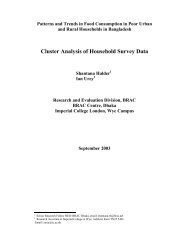
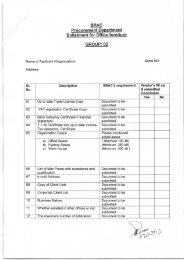
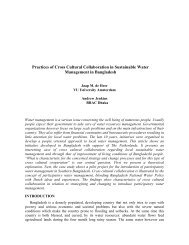
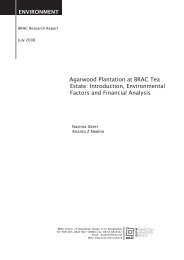
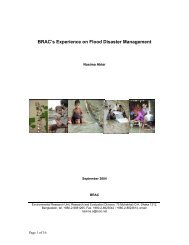
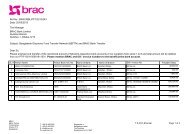
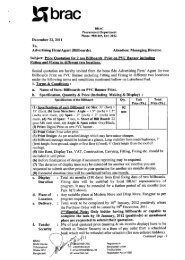
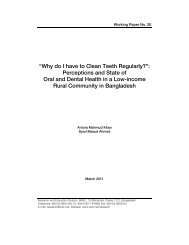
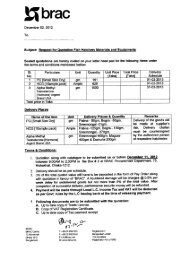

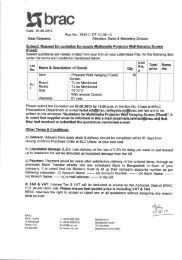
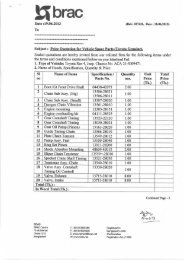
![[re-tender] RFQ for supply of Diesel Generator - Brac](https://img.yumpu.com/44421374/1/186x260/re-tender-rfq-for-supply-of-diesel-generator-brac.jpg?quality=85)
